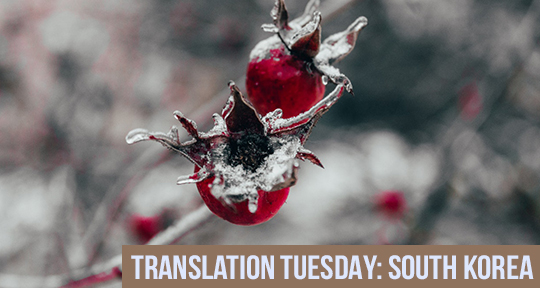Arguably South Korea’s most well-loved poet, we are thrilled to feature the award-winning Jeong Ho-seung and Brother Anthony’s translation of his poems in this week’s Translation Tuesday. All five poems, gathered from the poet’s 2020 collection Dangsineul chajaseo (Seeking You), move quite literally between the bird’s-eye view and the human’s-eye view—depicting a speaker who is learning to look at the world through a less anthropocentric, more hybrid and expansive set of eyes. Jeong’s poems show the reader what poetry can achieve through this expanded view of the world: his diction is at once sparse and emotive, his vision at once child-like and invested with wisdom. A skilful blend of the humorous and the philosophical, these poems invite us to shed our human ego and behold the landscape in ways that can centre not us but the world.
Bird Droppings 1
Bird droppings got into my eyes.
For the first time in my life
I washed my eyes clean with bird droppings.
It stopped me seeing the human landscape
that I finally wanted to see
but did not need to see.
Thank you.
Bird Droppings 2
When I see bird droppings on the ground
as I walk along,
it rather makes me feel relieved.
Since among human paths there’s a beautiful path
where birds leave their droppings,
by walking along that path
today once again I become a beautiful human being.
Bird Droppings 3
I give my food to the birds
while I peck at the birds’ feed.
Walking along a pathless path,
no matter how hungry I am
I give the birds all my food
while I peck at the birds’ feed all my life long.
After a bird has enjoyed my food
it shits while flying far up in the sky.
Its droppings fall to the ground.
Birds do not shit in the sky,
ultimately, they shit on the ground.
Before you can say that a human path is beautiful
there has to be bird shit on it
and I have to walk along that path
if I am to become beautiful.
Self-Introduction
My ear is a mouth.
My mouth is an ear.
When I get up in the morning and look at my face
my mouth is attached to my ear,
my ear is attached to my mouth.
So I now speak with my ear,
listen with my mouth,
and when I smile, I smile with my ear
and sometimes at the smile of my ear
wild birds perching on pine trees
smile with me.
No matter where I go,
or who I meet,
because I speak with my ear and listen with my mouth,
I keep talking in birdsong
and hear everyone’s words
as birdsong.
A Poem Written by Birds as Footprints on the First Snow
I will never come back.
I will never spread my wings and return to the village where humans live,
will never become part of a dirty human landscape.
Though through the first snow cornelian cherries
gently reveal their red breasts and wait for me,
I will never again fly from afar into human hearts
and sing, no matter how long they wait.
Now I will fly to a place where there are no living and no dead,
where there is nowhere to go back to, no time to go back to,
and I will say:
Humans, shut up and be silent.
Translated from the Korean by Brother Anthony
Jeong Ho-seung was born in 1950. He began to publish poems in the early 1970s, has published numerous poetry collections as well as collections of essays and fables, and has become Korea’s most popular poet, as well as being frequently invited as an inspiring public speaker on themes such as life, love, pain, hope, and death. Many dozens of his poems have been set to music by popular folk singers. Two bilingual volumes of Brother Anthony’s translations of his poems, as well as of the prose fables “Loving” and “Lonesome Jar” have been published by Seoul Selection in recent years.
Brother Anthony was born in England in 1942. He is a member of the Community of Taizé and has lived in Korea since 1980. He is an emeritus professor at Sogang University and a chair-professor at Dankook University. A naturalized Korean citizen, he was awarded an Honorary MBE by Queen Elizabeth in 2015. He has published some fifty volumes of translated Korean poetry and several novels. He is currently engaged in translating popular fiction by younger Korean writers, with several novels due to be published in the coming years. His home page is well-known: http://anthony.sogang.ac.kr/.
*****
Read more from Translation Tuesdays on the Asymptote blog:

